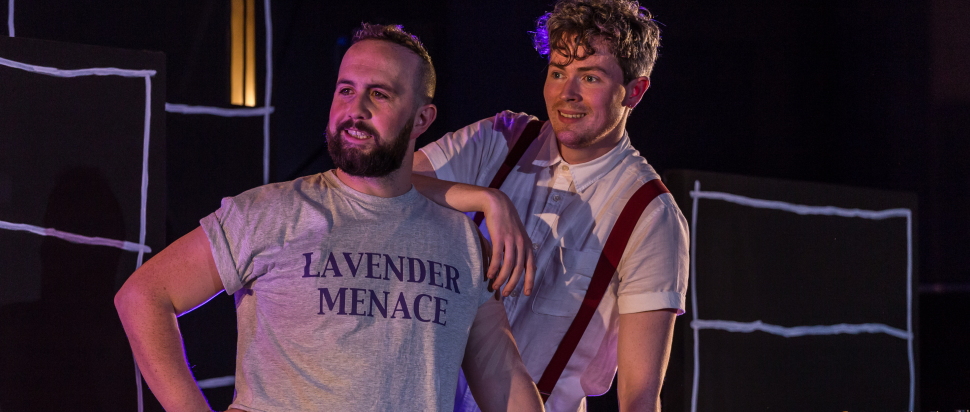Love Song to Lavender Menace @ Royal Lyceum, Edinburgh
Watching Love Song to Lavender Menace is a joyous and celebratory experience
Two years since its original run at the Lyceum, Love Song to Lavender Menace returns to Edinburgh. Written by James Ley and directed by Ros Philips, the play is a riotous celebration not just of queerness and the 1980s, but also of one very special bookshop: Lavender Menace, which opened in Edinburgh in 1982 but sadly closed in the 90s.
Katharine Williams’ beautiful lighting design illuminates the stage, turning it into both a bookshop and a gay nightclub. The two male leads, Lewis (Pierce Reid) and Glen (Matthew McVarish), have excellent chemistry, putting on a metatheatrical performance encompassing numerous personas. The voice of Sigrid Nielsen also features in the play, and Sigrid and Bob Orr – the original owners of the bookshop – appear in person with a pop-up Lavender Menace in the foyer of the Lyceum Theatre.
Love Song to Lavender Menace takes audiences back to the 1980s, when homosexuality had only recently been legalised in Scotland, Aids ravaged the queer community, and Margaret Thatcher used Section 28 to crack down on the alleged promotion of homosexuality in schools. In the face of such bleakness, the play is unabashedly camp and optimistic, and it certainly helps watching it in 2019 knowing how much progress has been made since then, even if the fight is not yet over.
Love Song to Lavender Menace could seem a little dated at a time when the LGBTQ+ movement continues to expand and diversify. Its leads are two white men, and the play’s focus is mainly on the G and the B in the initialism, despite referencing in its title the radical lesbians who were perceived by some as a ‘Lavender Menace’ in the 1960s and 70s. Mention is made of the wider gay liberation movement of the 20th century, but the play’s main theme is the male-male love represented by the attraction felt between the two characters on stage. To be sure, no single play can encompass an entire movement, so its exclusion of trans perspectives is arguably not a failing of Love Song to Lavender Menace, but rather evidence of the desperate need for more feisty, queer plays like it.
Love Song to Lavender Menace presents queerness as something natural and beautiful, but nor does it shy away from the messier sides of love. Watching the play, regardless of how you identify, is a joyous experience.
Royal Lyceum Theatre, Edinburgh, run ended
